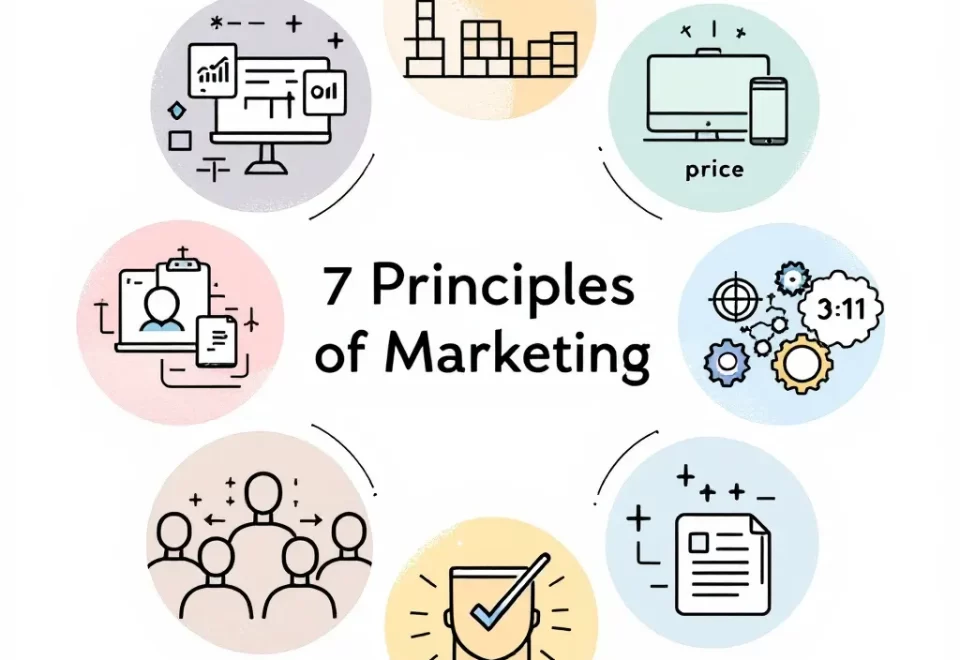Today’s digital age has proven that social media reigns supreme in every part of our lives, and businesses continue to recognize its immense potential for reaching and engaging with their target audience. However, harnessing the power of social media marketing requires more than just posting content and hoping for the best.
To truly drive business growth, entrepreneurs, marketers, and business owners need to leverage data analytics to gain valuable insights that inform their marketing strategies and optimize their campaigns. Interested in learning more? Join us as we explore the importance of data analytics in social media marketing, delve into actionable insights, and provide practical tips for businesses to thrive in the competitive digital landscape.
A. Understanding the Role of Data Analytics in Social Media Marketing
1. The Value of Data in Social Media Marketing
Data analytics is the process of collecting, analyzing, and interpreting data to gain meaningful insights and make informed decisions. In the realm of social media marketing, data holds tremendous value as it provides businesses with a deeper understanding of their target audience, their preferences, and their behaviors. By tapping into the wealth of data available on social media platforms, businesses can unlock opportunities for growth, optimize their marketing efforts, and enhance their overall marketing strategy.
2. Key Metrics to Track
To extract actionable insights from social media data, it is essential to focus on key metrics that align with your marketing goals. It goes without saying that you should know which channels to post content on as well as on which social network you should share content most frequently but you don’t want to stop there. Some of the metrics worth tracking include:
Engagement Metrics
Likes, comments, shares, and click-through rates are some of the engagement metrics that can indicate how well your content resonates with your audience. Monitoring these metrics helps identify which types of content generate the most engagement and drive meaningful interactions.
Reach and Impressions
These metrics provide insights into the size of your audience and the number of times your content has been seen. Understanding the reach and impressions of your social media posts enables you to gauge the effectiveness of your campaigns and improve your content distribution strategy.
Conversion Metrics
Conversion metrics, including website traffic, lead generation, and sales, are crucial for measuring the effects of your social media marketing campaign on your bottom line. Tracking conversions allows you to identify the most effective channels and strategies that drive tangible business results.
Customer Sentiment Analysis
Monitoring customer sentiment through sentiment analysis tools enables you to gauge the overall sentiment surrounding your brand and products. This information is invaluable for understanding customer perceptions, identifying areas for improvement, and responding promptly to customer feedback.
Want to level up your social media marketing today with data analytics?
Contact Growth Hackers
B. Leveraging Data Analytics for Actionable Insights
1. Identifying and Understanding Your Target Audience
Data analytics helps businesses gain a comprehensive understanding of their target audience by analyzing demographic information, interests, online behavior, and preferences. Interpreting data is more important than collecting it. This knowledge enables businesses to craft highly targeted marketing campaigns that resonate with their audience, increasing the likelihood of engagement and conversions.
To identify and understand your target audience effectively, consider the following approaches:
Use Social Media Analytics Tools
Platforms like Facebook Insights, Twitter Analytics, and LinkedIn Analytics provide valuable audience insights, including demographics, interests, and engagement metrics. Leverage these tools to understand who your audience is and what content resonates with them.
Conduct Surveys and Interviews
Supplement your data analytics efforts by directly engaging with your audience through surveys and interviews. This qualitative data can provide deeper insights into their motivations, pain points, and preferences, allowing you to tailor your marketing strategies accordingly.
Implement Audience Segmentation
Segmenting your audience based on various characteristics, such as age, location, interests, and purchase history, allows you to create targeted content and messaging for each segment. This approach ensures that your social media efforts are more relevant, impactful, and likely to drive business growth.
2. Optimizing Content Strategy
Data analytics allows businesses to evaluate the performance of their content and make informed decisions to improve their content strategy. Here are some steps to optimize your content strategy using data analytics:
Analyze Content Performance
Use social media analytics tools to observe your content’s performance. Identify the types of posts that get the highest engagement, reach, and conversions. Look for patterns in content formats, topics, or storytelling techniques that resonate with your audience.
Conduct A/B Testing
Experiment with different variations of your content to identify what works best. Test elements such as headlines, visuals, captions, and call-to-action buttons. By comparing the performance of different versions, you can refine your content strategy based on data-driven insights.
Leverage Trend Analysis
Keep an eye on social media trends and viral content within your industry. Identify topics or formats that are gaining traction and find ways to incorporate them into your content strategy. This can help you stay relevant and capture the attention of your target audience.
Optimize Posting Times
Analyze data on when your audience is most active on social media platforms. Schedule your posts during those peak times to maximize reach and engagement. Experiment with different posting schedules and track the performance to determine the optimal times for your specific audience.
Monitor Content Feedback
Pay attention to the comments, messages, and mentions you receive on social media. Use sentiment analysis tools to gauge the overall sentiment surrounding your content. Address any negative feedback promptly and engage with positive comments to foster a sense of community and loyalty.
3. Measuring Campaign Effectiveness
Data analytics plays a vital role in measuring your social media marketing campaign’s success. Here’s how you can leverage data to evaluate and optimize your campaigns:
Set Clear Goals and KPIs
Before launching a campaign, define specific goals and key performance indicators (KPIs) that align with your business objectives. These could include metrics such as conversions, leads generated, website traffic, or brand awareness. Having well-defined goals enables you to measure success accurately.
Use Campaign Tracking Tools
Implement tracking pixels or UTM parameters to track your campaign’s performance across different platforms. This allows you to attribute conversions and other desired actions to specific campaigns, providing insights into which channels and strategies are most effective.
Analyze Conversion Funnels
Dive deeper into your conversion metrics by analyzing the steps that users take from initial engagement to conversion. Identify potential bottlenecks or areas of improvement in the funnel. Optimize landing pages, CTAs, and messaging to increase conversion rates at each stage of the funnel.
Conduct Competitor Analysis
Keep an eye on your competitors’ social media campaigns and strategies. Analyze their content, engagement metrics, and campaign performance. Look for gaps or opportunities in the market that you can leverage to differentiate your own campaigns and stand out from the competition.
Iterate and Improve
Continuously observe and analyze the performance of your campaigns. Identify trends, patterns, and areas of improvement. Use data insights to make data-driven adjustments, such as refining targeting criteria, optimizing ad spend, or experimenting with new creative elements. Regularly iterate on your campaigns to achieve better results over time.
Harness the power of data analytics for social media marketing today!
4. Monitoring and Managing Brand Reputation
Brand reputation plays a vital role in the success of social media marketing efforts. Here’s how data analytics can help you monitor and manage your brand’s reputation effectively:
Track Brand Mentions
Use social listening tools to follow mentions of your brand across social media platforms. This includes direct mentions, tags, or discussions related to your products or services. Analyze the sentiment associated with these mentions to gauge overall brand perception.
Respond to Customer Feedback
Promptly respond to customer feedback and inquiries on social media platforms. Whether it’s a positive comment, a negative review, or a customer query, engaging with your audience shows you value their opinions and are dedicated to providing excellent customer service. Addressing customer concerns in a timely and helpful manner can help mitigate any potential damage to your brand’s reputation.
Implement Sentiment Analysis
Utilize sentiment analysis tools to gain a deeper understanding of how customers perceive your brand. By analyzing the sentiment of social media mentions, you can identify trends and patterns in customer sentiment. This allows you to proactively address any negative opinions, identify areas for improvement, and capitalize on positive views to strengthen your brand image.
Collaborate with Influencers and Brand Advocates
Influencer marketing can bring a lot of visibility to your business. Leverage data analytics to identify influencers or brand advocates who have a positive impact on your brand’s reputation. Analyze engagement metrics, reach, and audience demographics to find influencers aligned with your brand values and target audience. Building relationships with these individuals can amplify your brand message and enhance your reputation.
Monitor Competitor Reputation
Analyze the online reputation of your competitors to gain insights into their strengths and weaknesses. Identify areas where your brand can differentiate itself and leverage your reputation management efforts accordingly. By staying informed about your competitors’ brand reputation, you can position your brand as a preferred choice within your industry.
5. Staying Ahead of the Competition
Data analytics in social media marketing provides businesses with a competitive advantage by allowing them to stay ahead of their competitors.
Here’s how you can leverage data to outperform your competition:
Competitor Analysis
Continuously monitor your competitors’ social media presence and campaigns. Analyze their content, engagement metrics, and audience demographics. Identify successful strategies they are implementing and find opportunities to differentiate your own campaigns and offerings.
Identify Industry Trends
Use data analytics to identify emerging trends within your industry. Stay informed about new social media platforms, content formats, or marketing techniques that are gaining popularity. By being an early adopter and incorporating these trends into your strategy, you can position your brand as an industry leader.
Audience Insights
Analyze the data you gather from your target audience to uncover unique insights. Identify gaps in the market or unmet customer needs that your competitors may not be addressing. Use these insights to create innovative marketing campaigns and offerings that resonate with your audience and give you a competitive edge.
Test and Iterate
Continuously test and iterate on your social media marketing strategies. Experiment with different approaches, content formats, and targeting criteria. Measure the performance of your campaigns and make data-driven adjustments to optimize your efforts. By staying agile and adaptive, you can quickly respond to changing market dynamics and outperform your competition.
Final thoughts About Data Analytics for Social Media Marketing: Driving Business Growth through Actionable Insights
Data analytics has revolutionized the way businesses approach social media marketing. By harnessing the power of actionable insights derived from social media data, entrepreneurs, marketers, and business owners can make informed decisions, optimize their campaigns, and drive business growth.
In a world where social media platforms are saturated with content, businesses that embrace data analytics and apply actionable insights will be the ones that stand out, engage their audience effectively, and drive tangible business results. So, take advantage of the power of data analytics in your social media marketing endeavors, continuously analyze and optimize your strategies, and watch your business thrive in today’s interconnected digital world. You can either do this yourself or seek the expertise of marketing professionals.
Growth Hackers is a full-service data analytics agency helping businesses from all over the world grow. There is no fluff with Growth Hackers. We help entrepreneurs and business owners supercharge their social media marketing with data analytics, increase their productivity, generate qualified leads, optimize their conversion rate, gather and analyze data analytics, acquire and retain users and increase sales. We go further than brand awareness and exposure. We make sure that the strategies we implement move the needle so your business grow, strive and succeed. If you too want your business to reach new heights, contact Growth Hackers today so we can discuss about your brand and create a custom growth plan for you. You’re just one click away to skyrocket your business.








